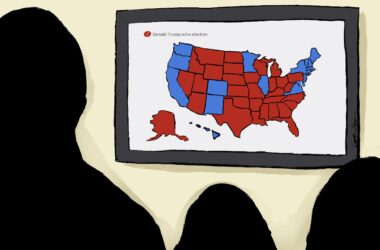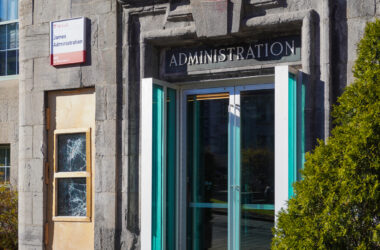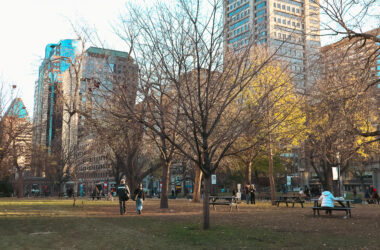 Sophie Silkes
Sophie SilkesRedpath Hall was filled with book lovers searching for rubies in the dust at the 40th annual McGill Book Fair held late last week.
Founded by the Women’s Association of McGill in 1971, the Book Fair is now run by an independent group of volunteers, mostly elderly women who self-identify as the “Book Fairies.” It’s the culmination of a yearlong process, beginning in February, when the Fairies receive and sort through thousands of donated books.
“They come flooding in, you have no idea,” said Victoria Lees, the co-ordinator of the Book Fair since 2008, and former secretary-general of the university. “Some smell like tomcat, some are mildewed, some are wet.”
The unsold volumes are later distributed to various charities in places ranging from Verdun to Ghana. Lees predicts that for each book that ends up on the tables, at least 150 others have passed through her hands.
The acceptable books are then sorted into categories and priced by volunteers with some background knowledge of their respective subjects. The Fairies stock the books in boxes in a small corner of what Lees calls “beautiful subterranean Redpath Hall,” despite the basement’s musky stench and clear evidence of recent floods.
One browser in the political science section said she continues to go to the Book Fair “to get cheap books that interest me.” The books at the fair are of remarkably good quality, and are sold to students and other shoppers at reasonable prices.
Last year the fair raised $86,021. While McGill permits the Fairies to use Redpath Hall at no charge, the fair has to pay for tables, security, and various other expenses associated with running a special event.
After all expenses, last year the Fairies voted to give a $75,000 cheque to the Faculty of Music. “There’s a very strong feeling among the Book Fairies that it should go toward [need-based] bursaries, rather than [merit-based] scholarships,” Lees said.
According to Lees, book collectors from as far as Nova Scotia and New England line up at 7 a.m. on the first day of the fair, waiting for it to open at 9 a.m. The most expensive book sold this year was an original edition of Samuel Johnson’s 1755 Dictionary of the English Language, which went for $1,800. A signed copy of Leonard Cohen’s first novel, The Favourite Game, sold for $750.
“There are treasures here to be bought,” says Frances Groen, former director of McGill Libraries, and the Fairy responsible for pricing the history section.
Ilea Tant, the Book Fairy in charge of the special collection of rare and fragile books, said she would often spot a book and ask herself who would possibly want to buy it.
“Then I see someone going through the books,” she said, “and they say, ‘My God, I’ve been looking for that book for 20 years.'”
Lees, who completed her PhD in English literature at McGill, says that one benefit of the Book Fair is that “old ladies who still want to contribute to the university have a place to do so.”
Another Fairy, Betty, a volunteer since 1971, has a simpler reason for working the Book Fair. “I like the books,” she said with a bashful smile.
The Book Fair also offers jobs to students to help out as cashiers and as informal security staff. A cultural studies student, seemingly a Book-Fairy-in-training, who has worked the fair both of her two years at McGill, said, “There’s a lot of really nice people that work here, and a lot of interesting people who come here. People come from all over the place.”
Since 1971, the McGill Book Fair has raised more than $1.5 million dollars for student bursaries and scholarships.
Lees dismissed any suggestion that books or book fairs might be declining as e-readers rise in popularity.
“My theory is that God loves book fairs,” she said adamantly.








